Chinese youths flock to canteens for the elderly
The affordable prices and wide variety of dishes at community canteens are attracting the younger generation, but is that all? Lianhe Zaobao journalist Meng Dandan finds out.
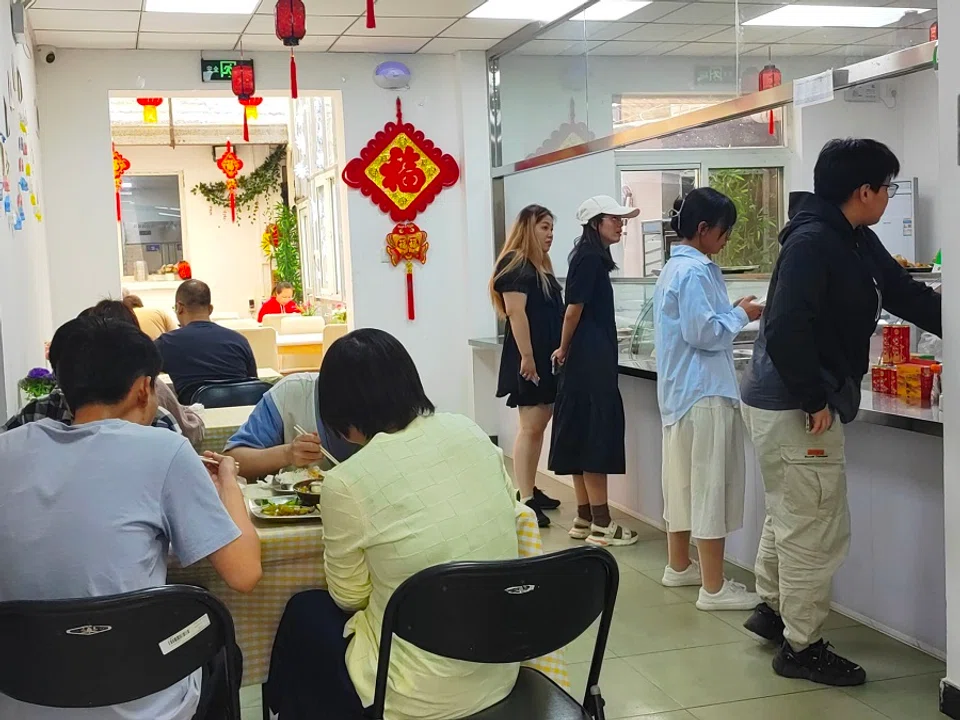
(Photos: Meng Dandan/SPH Media)
Around lunchtime, the hutongs in downtown Beijing would gradually come alive as groups of young white-collar workers excitedly head towards the community canteens for the elderly tucked away within.
Office workers’ choice of lunch
The canteen, which measures 200 to 300 square metres, gets crowded in no time. Here, you can get a plate of Chinese lettuce for 8 RMB (US$1.10), a bowl of boiled fish for 15 RMB, a plate of twice-cooked pork for 18 RMB and even a bowl of tomato and egg soup for free. Both the young and old can be seen queuing for the nearly ten types of piping hot dishes on offer. The line can even extend all the way to the entrance during peak hours.
Shen Min, a 27-year-old office worker, takes advantage of a community canteen in a nearby hutong to settle her meals five days a week. “I can get three dishes and a soup for 21 RMB. This is much more affordable than ordering takeout,” she said, pointing at the two vegetables and gravy-drizzled white cut chicken in front of her.
She added, “The food here has more value for money than small eateries elsewhere. I feel safe eating it as well.”
With the accelerated pace of urban life, many youths also find themselves too busy to cook, making community canteens with affordable prices and a wide variety of dishes increasingly appealing.
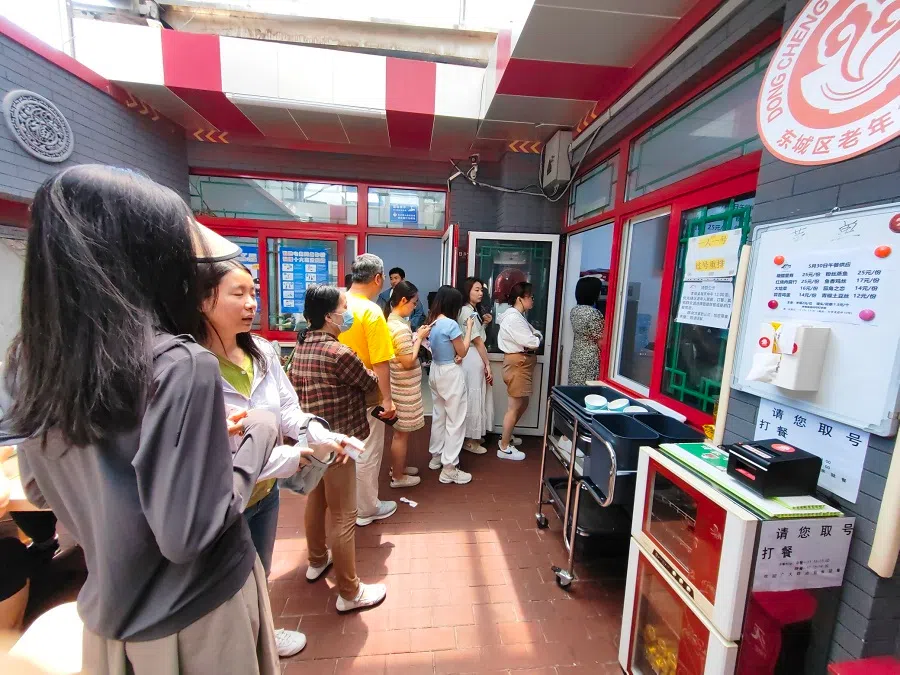
Such community canteens for the elderly that Shen frequents are being “taken over” by young Chinese white-collar workers.
China’s employment market has been grim over the past two years, and some employees have experienced pay cuts. With the accelerated pace of urban life, many youths also find themselves too busy to cook, making community canteens with affordable prices and a wide variety of dishes increasingly appealing.
Chinese state media Xinhua News Agency reported that there were over 6,700 community canteens operating nationwide in 2023. They are not only mushrooming in first-tier cities such as Beijing, Shanghai, Guangzhou and Shenzhen, but also taking over western and central cities such as Chengdu and Wuhan.
In fact, community canteens have been around for several years. Their initial aim was to cater to elderly individuals with mobility issues or who are unable to cook for themselves. Subsequently, community canteens began welcoming people of all ages to reduce operating costs.
“All the people around me are penny-pinching as much as they can. This made me feel a little guilty.” — Shen Min, a 27-year-old office worker
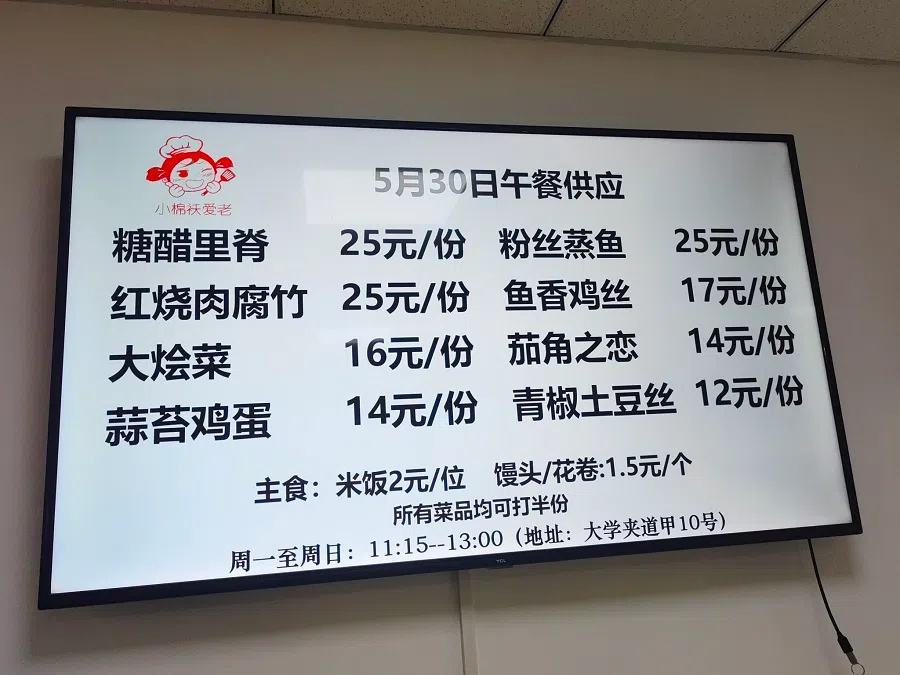
Last year, the company Shen works at began reducing employee welfare and closed the staff canteen. In place of the free meals, employees were given a monthly subsidy of 800 RMB. Shen would order takeout or organise a group buy with her colleagues for discounted set lunches at nearby restaurants.
After a few months, she found that the amount she spent on lunch far exceeded the subsidy provided by the company, and this made her uneasy. She said, “All the people around me are penny-pinching as much as they can. This made me feel a little guilty.”
She eventually found out about a community canteen near her office on social media. The government-funded canteen offers more affordable meals compared with ordering takeout or dining at regular restaurants, and even boasts a wide variety of dishes.
... prices at her canteen are nearly 20% lower than the surrounding restaurants due to government subsidies.
Government support for community canteens
Beijing is one of the Chinese cities that have entered “deep ageing”, with over 3.3 million people aged 65 and above, accounting for 15.1% of the total population. To meet the food needs of a fast-ageing society, there are over 1,100 community canteens for the elderly across the city. Most of these canteens are funded by the government, enjoying either free spaces, construction funds or reduced utility bills and taxes.
Lu, a manager at a community canteen in Beijing’s Dongcheng district that opened this year, told Lianhe Zaobao that prices at her canteen are nearly 20% lower than the surrounding restaurants due to government subsidies. Between 11am and 5pm, priority is given to the elderly, and delivery services are offered as well. At other times, the canteen mainly serves office workers from nearby, with the younger generation accounting for over 80% of the total footfall.
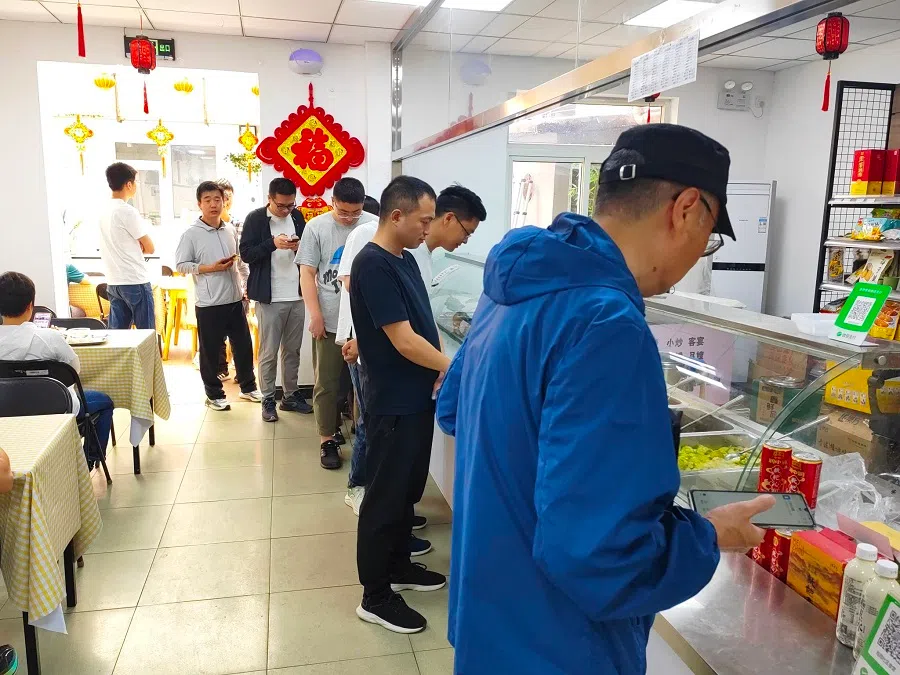
Song, 25, who started working at a publishing house in Beijing this year, recently became a frequent patron of community canteens. She had previously relied mostly on takeout.
Song’s meal — half a serving of stir-fried pork with three vegetables; celery lettuce with black fungus; and a bowl of rice — costs 17 RMB. She told Lianhe Zaobao, “Eating here is much cheaper than ordering takeout. If I have both lunch and dinner here, I can save 10 to 20 RMB a day.”
Most of the white-collar workers who dine alone in the canteen are men. They scroll away on their phones while eating, and leave in a hurry after they are done. There are also youths who come in groups, mostly chatting quietly while eating, and leaving promptly after their meal. A small minority are the elderly; most of whom would take away the dishes in their own container, and only a handful would dine in at the canteen.
Not only are youths sharing the location of community canteens that offer affordable and delicious meals, they are also recommending the best value-for-money dishes.
Making every penny count
Compared with bustling commercial restaurants, it is much quieter at community canteens. But discussions about them are lively and vibrant on social media platforms popular among the younger generation.
Not only are youths sharing the location of community canteens that offer affordable and delicious meals, they are also recommending the best value-for-money dishes. Some community canteens near tourist attractions are even hailed as “treasure troves” for budget travellers to replenish their energy along the way.
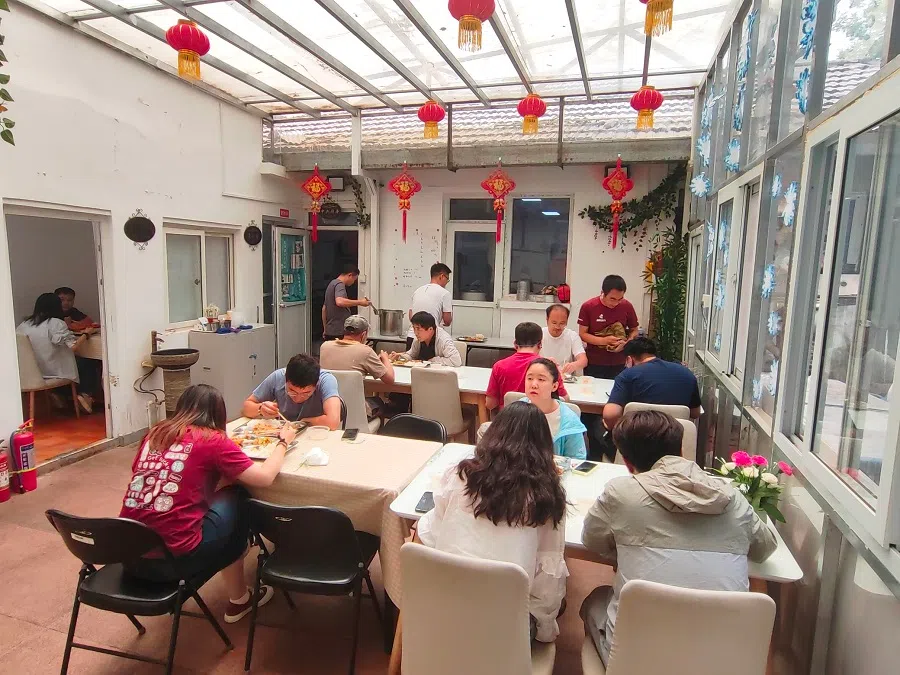
Youths taking advantage of community canteens and making every penny count not only reflects their focus on cost-effective and pragmatic consumption but also their reluctance to spend amid economic pressures.
Financial columnist Zhang Lin said when interviewed that youths and the elderly typically do not dine at the same places due to differing consumption habits. But the younger generation is now voluntarily stepping into community canteens, indicating that after the pandemic, the employment and income pressures that youths face are indeed real. They are no longer as optimistic about the future and are unwilling to spend excessively.
Zhang also pointed out that Chinese youths are working longer hours and have no time for grocery shopping or cooking, which is another reason why they seem to be taking advantage of this amenity for the elderly. Statistics from China’s National Bureau of Statistics showed that the average weekly working hours of employees of enterprises lengthened to 49 hours in 2023. This equates to 9.8 hours a day for a five-day work week.
This article was first published in Lianhe Zaobao as “越来越多中国年轻人光顾廉价养老食堂”.





